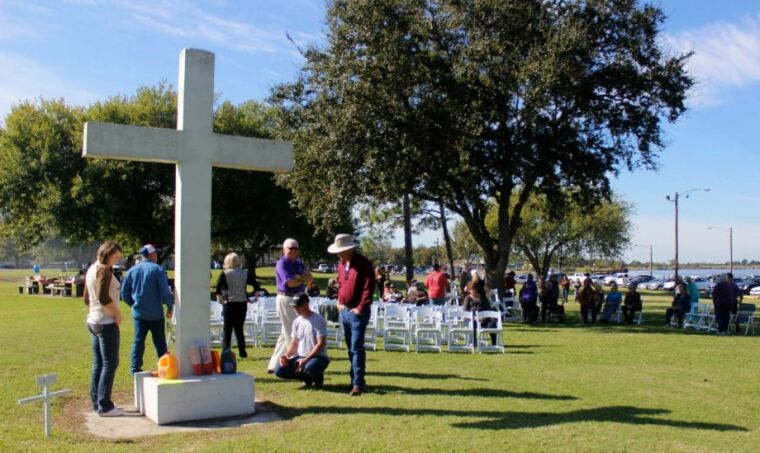Church buys city park land to preserve cross monument; atheists offered 20-times the purchase price

PORT NECHES, Texas (Christian Examiner) – A Methodist church in Texas has purchased a small plot of land from the city of Port Neches so a small Latin cross monument in a public park there will not have to be removed.
City leaders agreed to the sale of the land where the cross has stood for 45 years to First United Methodist Church to avoid an almost certain lawsuit from the litigious Wisconsin-based atheist group known as the Freedom from Religion Foundation.
The controversy over the concrete block cross in the park began last year when FFRF complained that the presence of the cross violated the First Amendment to the U.S. Constitution, which forbids an establishment of religion. In some instances, however, such monuments – which have stood for decades – are considered important for their cultural or historical value.
I would say it's a win-win situation for everybody involved. ... Folks were concerned about having the church on public property. It's no longer on public property. At the same time the church is not dismantling it.
For instance, in Van Orden v. Perry in 2005, the U.S. Supreme Court ruled a Ten Commandments monument could remain on the grounds of the Texas State Capitol because of its long-standing historical importance.
Crosses seem to be different in the eyes of the court, even when supporters argue that the white Latin cross is a traditional memorial commemorating valor and sacrifice. But churches and private organizations seem to have found a workaround – purchasing the land on which the crosses sit.
That practice began in 2015 when the U.S. Department of Defense agreed to the sale of a $1.4 million tract of land on which the Mount Soledad Veterans Memorial stood atop a hill in San Diego. The property, including the 27-foot-tall white cross, was sold to the private Mount Soledad Memorial Association and the cross was allowed to remain.
In the case of the Port Neches cross, the church got a much better deal. It was able to buy a 20 x 20 parcel of land around the cross for $100.
That angered the Wisconsin atheist group. Its leaders, Dan Barker and Annie Laurie Gaylor, quickly fired off a letter to the city's mayor, Glenn Johnson, offering 20 times as much for the land.
"We are prepared to offer $2,000 for the same parcel," the letter from FFRF said.
Later, in a public announcement of its desire "to be generous to [the] Texas town," FFRF said it was concerned that the city was penalizing itself by not accepting a larger sum for the land and that it might still be violating the law by allowing "a sweetheart deal" for the land – that is, engaging in the sale of the land without a formal bidding process. However, under Texas state law, park land may be sold by a municipality without a formal review process if the amount of land is less than one acre.
FFRF claims that if the purpose for the sale of the land was merely to save the cross, it is still invalid and the process is not closed.
But that isn't the case, according to the city's attorney, Phillip Brent. He told the Port Arthur News that the matter is closed and the church is now responsible for maintaining the 400-square-foot plot of land.
Rebecca Markert, senior staff attorney with FFRF, said she and the atheist group expect the city to place a marker at the site notifying visitors that the cross is on private property.
The Beaumont Enterprise reported, however, that the church – while it will maintain the property – has no plans to place a fence around the cross of to make the area look any different than the remainder of the park. It also said it has no plan to place a sign there making everyone aware that the cross is on church property, rather than on property owned by the city.
"Our plans are to leave it as-is," Wesley Welborn, the church's pastor, told the paper.
"I would say it's a win-win situation for everybody involved," Welborn said. "Folks were concerned about having the church on public property. It's no longer on public property. At the same time the church is not dismantling it."